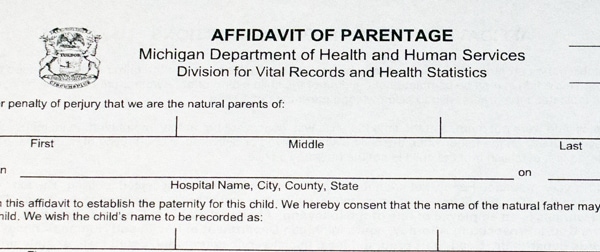
This article provides background on the Affidavit of Parentage. In this article, we address common concerns such as when someone should sign the document and what to do if there’s uncertainty as to who the biological parent is. Throughout the article, we’ll answer these common questions and provide other necessary information on the document.
An Affidavit of Parentage is a form signed by both unmarried parents that acknowledges, under the penalty of perjury, that they are the biological parents of a child. It is generally presented to the parents at the hospital after the child is born.
A man should only sign the document if he is absolutely, unequivocally (100%) sure that he is the biological father of the child.
If you are 100% certain that you are the biological father of the child, when you sign the form, you establish yourself as the child’s biological and legal father. Your name can now appear on the child’s birth certificate, and you have the ability to assert custody and parenting time rights in the family division of the appropriate circuit court. This is an important step as an executed Affidavit provides the mother of the child with sole legal and physical custody.
In signing an Affidavit of Parentage, a man is agreeing to waive several important rights, including the right to genetic testing to scientifically determine whether or not he is the child’s biological father, and the right to a trial to determine if he is the biological father.
Within a certain time frame of having mistakenly signed the form, a man can file an action in the family division of the appropriate circuit court and request that the paternity distinction be revoked. This is an extremely complicated area of law that should only be navigated with the assistance of a highly experienced family law attorney.
In Michigan, the Affidavit of Parentage is prepared by the Michigan Department of Health and Human Services Division for Vital Records and Health Statistics. The document has two pages. The first page has information such as the mother and father’s name, current address, date of birth etc.
The second page has instructions on properly filling out the information, signing the form, and submitting it. It’s important to note that both the mother and father must sign the document at a Notary Public or witness who’s “qualified.” Examples of qualified witnesses include: health clinics, hospitals, prosecuting attorneys, or a Friend of The Court. There are other examples of qualified witnesses you can find within the document’s instructions on page 2.
To file the affidavit and establish paternity, the form can be mailed to the following address:
Central Paternity Registry
Division for Vital Records and Health Statistics
Michigan Department of Health and Human Services
PO Box 30691
Lansing, MI 48909
Here’s a blank PDF example of a Michigan Affidavit of Parentage (Form DCH-0848). This form is publicly available on the state’s website.

Under certain circumstances, paternity may be revoked. That is an alleged father, confirmed father, or attorney may file an action 3 years subsequent to the birth of a child or within a year after the acknowledgement of parentage was signed. According to the Michigan Law:
“722.1437 Action for revocation of acknowledgment of paternity; filing; agreement to transfer prosecutor’s responsibilities; proceeding on behalf of state; affidavit; order for blood or tissue typing or DNA identification profiling; forwarding copy of order to state registrar; vacating acknowledgment of parentage; amending birth certificate; representation.” (Michigan Legislature Section 722.1437, 2012, REVOCATION OF PATERNITY ACT 159).”
You can find additional information on this in Michigan’s Legislature Section 722.1437.